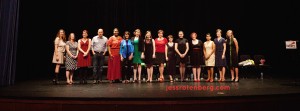>> BY LIISA OGBURN Late one night, this time a year ago, with the kids finally in bed, the dishes done, and the dogs walked, I went into my home office and fired up the laptop.
BY LIISA OGBURN Late one night, this time a year ago, with the kids finally in bed, the dishes done, and the dogs walked, I went into my home office and fired up the laptop.
The announcement for the first local Listen to Your Mother show popped up. The producers, Marty Long and KeAnne Hoeg, were seeking stories about motherhood by local writers for a live staged reading held the week of Mother’s Day 2013. It was part of a national movement started in 2010 by Ann Imig, who conceived of and produced the first show in Madison, Wisconsin.
“Why?” one interviewer asked her. Imig answered, “I felt like mothers deserved something more than a frittata once a year—something less retail-oriented and more community-focused.”
Since that first year, Imig has helped guide local productions in increasing numbers of cities across the country each year. Last year, 24 cities produced the show. This year, 32 will.
Last year, I sat down to try my hand at a story.
So much of motherhood is lived in the busy-ness of tending to others’ frequently mundane needs. Laundry, carpooling, cleaning, cooking, reading to, playing with, packing lunches, helping with homework, tucking in… At times it can all feel like we are on a gigantic, endless conveyor belt, just trying to keep up.
Writing requires you to stop, jump off, wipe the sleep from your eyes and look freshly at the scene. Joan Didion, in the White Album, wrote, “We tell stories to make meaning of our lives.”
And last year Listen to Your Mother gave me the opportunity to try to do just that. I’m not sure why, but I had the good fortune of being invited to read in the 2013 show.
I found the experience transformative. The sold out audience gave us a standing ovation. Many came up afterwards to say, “I thought I was the only one. Thank you for helping me put words to that experience.” More importantly, inside me, some lock released. And since then, I’ve gone on to attempt other risks and my collaborators from last year’s show have done the same. One even ran her first marathon.
Nationally, almost 500 storytellers have participated to-date. Well over 10,000 have attended the shows. More than $25,000 has been raised for local non-profits.
We’re now seeking stories for this year’s show. The deadline is January 31. Won’t you consider submitting yours? For more information, visit: >>http://listentoyourmothershow.com/raleighdurham/2014/01/06/now-accepting-submissions-for-2014/.
ABOUT LIISA OGBURN
I am a mother, daughter, wife, neighbor, community member, friend and adjunct professor at Duke University.
In 2000, I had a successful career as a director in an internet design firm in San Francisco; I had just about finished putting my husband through medical school and residency; and I had my first child, a healthy boy. By all appearances, I had a charmed life. Yet soon after my son’s birth, while balancing work, a new child and a sick family member, I became unable to sleep. If I did drift off, I would wake up convinced my son was crying for me. In reality, he wasn’t. I was breaking down. When I went to the Emergency Room, what I mistakenly insisted for months was a sleep disorder, they quickly diagnosed as severe postpartum depression. I recovered, but only after many, many months and with a new firm sense of my limitations and a radically different vision of what makes a good life.
That experience has been the driving motivation for this project and book. (You can read about that experience in a recent column in the New York Times here: http://parenting.blogs.nytimes.com/2012/10/02/postpartum-depression-what-to-expect-when-the-unexpected-happens/)
More than 80% of women in the United States today become mothers at some point in their lives. While we are more well-versed in how our bodies physically change than previous generations, we are less so in some of the more subtle, but profound ways we change. For many, the experience of motherhood is our first hard encounter with our limits, our vulnerabilities, and our lack of control.
Theater critic Kenneth Burke once said, “Stories are the equipment for living.” I’ve found that to be true. I am especially drawn to stories told when we are at points of extreme vulnerability, potential and change.
Over the last six years, I have collected hundreds of interviews for a variety of projects, as well as taught and mentored Duke undergraduates, fellows and medical residents. To see more of my work, visit: http://www.wiredforstories.com/.
There are no comments
Add yours